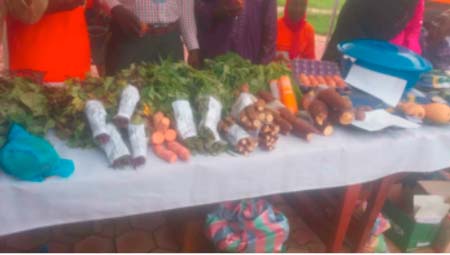
(Friday 18 October 2019 Issue)
European Union food fortification funded project, titled “Improving Food Security and Nutrition in The Gambia through Food Fortification,” in partnership with Food and Agriculture Organisation (FAO) of the United Nations and partners, Tuesday launched the social behavior change and communication nationwide caravan at Westfield youth monument.
The
project aims at improving the nutritional and health status of vulnerable
populations from micronutrient deficiencies throughout The Gambia, particularly
targeting women, girls and children in the North Bank and Central River
Regions.
This
is expected to contribute to improvements in health and nutrition indicators,
especially the reduction of stunting and wasting and normal cognitive
development in children and reduce anemia among women, as well as reduction in
complications during pregnancy and maternal mortality.
Mooshibudi
Rampedi, FAO country representative said the awareness raising campaign could
not be launched at a better time, as it coincides with the World Food Day
celebrations under the theme: Healthy diets for a Zero Hunger world.
“Nutrition is one of the most important
contributors to human health. People who eat whole foods rich in nutrients live
longer and are protected against many chronic illnesses and over the years, the
government of The Gambia and partners worked hand in hand to reduce acute
malnutrition and stunting from 24.4% in 2010 to 19% in 2018,” she stated.
Madam
Rampedi however stated that more needs to be done while malnutrition remains a
major challenge in The Gambia.
She
said micronutrient deficiencies or “Hidden Hunger” such as Vitamin A, Iron,
Anemia and Iodine deficiency disorders are major public health concerns in The
Gambia, saying that similarly, these affect mostly children under the age of
five and women of reproductive age mainly due to inadequate intake of
micronutrients from the daily diet.
“The
good news is that opportunities exist to fight against malnutrition and
especially micronutrient deficiencies. As a specialised United Nations Agency
with a mandate to help countries eliminate hunger, food insecurity and
malnutrition, FAO is uniquely placed to support countries to strengthen their
policy and institutional environments so that their political commitment can be
translated into concrete action,” she added.
Darrell
SEXSTONE, Programme Manager of the European Union (EU) Delegation said the
effects of poor nutrition represent one of the most serious and preventable
tragedies of our time. “Indeed, the
World Health Organization considers that poor nutrition is the single most
important threat to the world’s health. In many developing countries it is an
underlying cause of at least one third of all child deaths and 20% of maternal
mortalities every year,” he lamented.
He
further narrated that progress is being made adding that statistics released in
the not too distant past showed that globally, around 165 million, or a quarter
of the world’s children, suffer from stunting and 2.6 million children under
the age of five die every year as a result of undernutrition.
Muhammadou
Lamin Jaiteh, PS office of the V.P said that effective and sustainable food
fortification and bio-fortification are crucial interventions for the
prevention and control of malnutrition especially micronutrient malnutrition.
P.S
Jaiteh revealed that in 2018, the government of The Gambia conducted a
nationwide survey to determine the prevalence of micronutrient malnutrition.
“The result of this survey has shown that micronutrient malnutrition
particularly vitamin A deficiency, Iron deficiency anaemia and iodine
deficiency disorders are highly prevalent in The Gambia,” he added.
He
stated that Social and Behavioural Change Communication materials were
developed to promote the consumption of the fortified and bio-fortified food as
well as ensure the diversification of our diet in general and it is in that
regard that stakeholders in the implementation of the SBCC programme are
embarking on a caravan tour of the country to sensitize the public on the
benefits of fortified and bio-fortified food.



